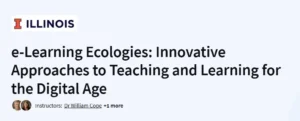What will you learn in Learning to Teach Online Course
Core principles and pedagogy of online teaching.
How to design engaging, inclusive, and effective online learning environments.
Strategies for interaction, assessment, and feedback in virtual classrooms.
Best practices for using technology and multimedia to support student learning.
Program Overview
Module 1: Getting Started with Online Teaching
⏱️ 1 week
Topics: Key differences between online and in-person teaching; learner diversity; accessibility.
Hands-on: Reflect on your current practice and explore online teaching scenarios.
Module 2: Designing Online Learning
⏱️ 1 week
Topics: Course structure, alignment of learning outcomes, designing assessments.
Hands-on: Map out a basic course plan and lesson framework for an online module.
Module 3: Engaging Online Learners
⏱️ 1 week
Topics: Student motivation, communication, fostering a sense of belonging.
Hands-on: Design an online discussion or interactive learning activity.
Module 4: Delivering and Supporting Online Learning
⏱️ 1 week
Topics: Delivery models, LMS platforms, providing timely support and feedback.
Hands-on: Draft a communication strategy and feedback model.
Module 5: Reflecting and Improving Online Practice
⏱️ 1 week
Topics: Continuous improvement, learner feedback, professional development.
Hands-on: Create a personal development plan and evaluate an existing course.
Get certificate
Job Outlook
Rising demand for online educators, instructional designers, and e-learning consultants.
Applicable in K-12, higher education, corporate training, and freelance teaching.
Salary potential: Online instructors can earn $40,000–$100,000+ based on sector and experience.
Strong foundation for those looking to teach on platforms like Coursera, Udemy, or school LMS.
Specification: Learning to Teach Online
|
FAQs
- No prior teaching experience required.
- Covers core principles of online pedagogy and instructional design.
- Suitable for K-12, higher education, corporate training, and freelance instructors.
- Focuses on practical strategies for engaging online learners.
- Emphasizes student-centered and inclusive course design.
- Learn to align learning outcomes with course structure.
- Techniques for creating interactive lessons and activities.
- Guidance on assessments, quizzes, and feedback methods.
- Best practices for multimedia and technology integration.
- Hands-on exercises to draft a course plan.
- Techniques for virtual discussion forums and group activities.
- Methods to increase student participation and collaboration.
- Strategies for personalized feedback and support.
- Builds skills for creating a sense of community online.
- Prepares educators to address diverse learner needs.
- Prepares for roles like online instructor, instructional designer, or e-learning consultant.
- Applicable to schools, universities, and corporate training.
- Strengthens skills for teaching on platforms like Coursera or Udemy.
- Enhances employability with a certificate of completion.
- Supports career advancement in digital education environments.
- 5 modules: Getting Started, Designing Online Learning, Engaging Learners, Delivering Support, Reflecting & Improving.
- Each module: ~1 week at a moderate pace.
- Self-paced with lifetime access.
- Hands-on activities in every module for practical application.
- Total duration: ~5 weeks.





